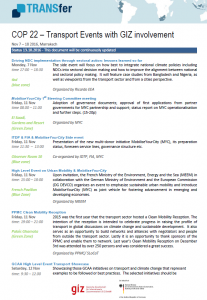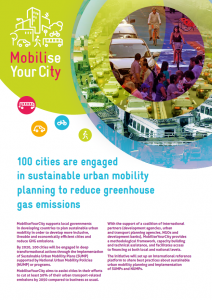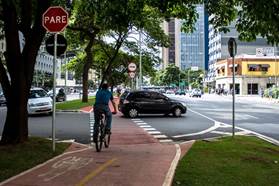Webinar on National Decarbonisation Strategies in the Transport Sector: The Example of Germany
SUTP invites you to join their first webinar in 2017 on Monday, May 8th!
In this webinar Christian Hochfeld, Director of Agora Verkehrswende, provides a detailed insight into the decarbonisation strategy of Germany’s transport sector and the intention behind Agora Verkehrswende – Transforming Transportation. Dr. Tania Rödiger-Vorwerk, Deputy Director General for Environment & Infrastructure at BMZ will reflect the necessity for a global transformation of the transport sector and how the German development cooperation plans to empower particularly local stakeholders in our partner countries.
The webinar addresses international development experts, local and national level policy-makers and planners, practitioners, academia and active citizens.
You can find all this information and further course offers on the Capacity-Building platform CAPSUT.
Monday, May 8th, 2017
07:00 – 08:00 Mexico City, Bogota (UTC-5)
09:00 – 10:00 Rio de Janeiro (UTC-3)
12:00 – 13:00 Windhoek (UTC+1)
13:00 – 14:00 Berlin (UTC +2)
14:00 – 15:00 Kyiv, Addis Ababa (UTC+3)
18:00 – 19:00 Bangkok (UTC+7)
19:00 – 20:00 Beijing, Shanghai, Manila (UTC+8)
Background
With the historical climate agreement in Paris the international community set itself an ambitious target for climate protection. To reduce global warming well below 2 degrees Celsius above the pre-industrial level, decarbonisation is the key issue that will define the debate over the future of the world’s energy and transport systems. Germany has the responsibility – like all other countries – to significantly cut greenhouse gas emissions. Many countries have already set ambitious targets and identified action areas for emission reductions in the transport sector within their Nationally Determined Contributions (NDCs).
Germany is a pioneer in the adoption of sustainable mobility, smart mobility and e-mobility concepts. At the same time, coined by its automobile industry, it is facing the challenge of structural transformation. To achieve the greenhouse gas reduction targets for 2030, 2040 and 2050, the transport related oil consumption needs to be drastically reduced. But transformation of the transport sector requires not only the substitution of fossil fuels by renewables. It also requires rethinking and optimising the entire mobility system in a holistic manner – by avoiding unnecessary traffic, shifting to environmentally friendly modes of transport and improving the efficiency of the transport system.
The transformation of our transport system is a complex challenge. It can only be achieved if the key players in the fields of politics, economics, science and civil society are working together. In partnership with these key players, Agora Verkehrswende lays the foundation for a comprehensive climate protection strategy for the German transport sector and supports its successful implementation.





 Even though Lima is described as having good geographic and climatic conditions for cycling, commutes by bicycle today have a mode share of mere 0.9%. The Metropolitan Municipality of Lima (MML) plans to increase this share to reach 2% by the end of 2018 and has started to carry out various initiatives and programs to promote cycling, such as car-free Sundays or awareness raising campaigns in schools and for car Drivers.
Even though Lima is described as having good geographic and climatic conditions for cycling, commutes by bicycle today have a mode share of mere 0.9%. The Metropolitan Municipality of Lima (MML) plans to increase this share to reach 2% by the end of 2018 and has started to carry out various initiatives and programs to promote cycling, such as car-free Sundays or awareness raising campaigns in schools and for car Drivers.